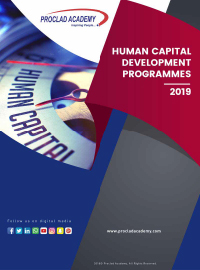Customer Relationship Management: Analysing & Integrating Key Components
| Ref No. | Dates | Venue | Fee (US$) | |
|---|---|---|---|---|
| CS 002 | 12 - 16 Apr 2020 | Dubai | 4500 | Register |
| CS 002 | 25 - 29 Oct 2020 | Dubai | 4500 | Register |
Customer Relationship Management: Analysing & Integrating Key Components
Introduction
Customers in today’s world are more discerning, more demanding and better informed. Buyer behaviour has also changed and along with it customer service expectations. What has not changed is the need to have customers come back to us. Maintaining outstanding customer relationship that makes the customer feel important and valued is an essential component to the organisation’s long-term success. Providing outstanding customer service often makes the difference between gaining and keeping a customer or losing one.
PROCLAD Academy’s Customer Relationship Management: Analysing & Integrating Key Components training course offers the tools and techniques to ensure you build and maintain beneficial relationships with customers, to make them become loyal supporters of your organisation. It also analyses the key components of CRM and explains how it is integrated within an organisation.
The key features of PROCLAD Academy’s Customer Relationship Management: Analysing & Integrating Key Components training course are:
- Customer Orientation
- Conceptual Thinking
- Balanced Decision Making
- Quality Orientation
- Persuading Others
Learning Objectives
Participants on PROCLAD Academy’s Customer Relationship Management: Analysing & Integrating Key Components training course will learn how to:
- Develop an understanding of the terms and benefits of CRM
- Analyse the different components of a CRM plan
- Identify how CRM creates value for organisations and customers
- Adopt techniques that routinely deliver positive customer service
- Maximize the value of your customer interactions
- Deal effectively with difficult customers and turn complaints into opportunities
- Contribute to a customer-centric culture and achieve greater personal growth and customer satisfaction
- Demonstrate a positive, confident and professional approach with internal and external customers
- Identity development roles that have the greatest impact on CRM
Target Audience
PROCLAD Academy’s Customer Relationship Management: Analysing & Integrating Key Components training course is beneficial to anyone from any organization who needs to build effective relationships with external and internal customers. This includes help desk, technical support, frontline or support staff. This training course will also be of interest to managers and team leaders wishing to coach and develop staff performance toward a customer-focused culture.
Training Methodology
PROCLAD Academy’s Customer Relationship Management: Analysing & Integrating Key Components training course will involve the use of slides, handout material, work manual with all instructor notes and slides, examples of best practice and appropriate video/DVD material. The use of flip-charts, syndicate workshops and reporting back sessions will encourage a fully participative and enjoyable event. Delegates will be encouraged to participate actively in relating work experiences.
Course Outline
- The importance of How
- Focusing on how as well as the what
- Developing a relationship of mutual trust
- Influencing customer perceptions
- Calculating the lifetime value of your customer
- Exceeding customer expectations
- Creating the Customer Experience
- Emotional aspects of the customer experience
- Making the initial connection with the customer
- Presenting a positive first impression
- Identifying the differentiators of excellence
- Taking responsibility for demonstrating customer care
- Navigating the customer through the process
- Instilling confidence with a personal approach
- Fostering long term relationships
- Adopting a positive mental attitude
- Small actions that ensure attention to detail
- Developing excellent communication skills
- Establishing rapport with your customer
- Personalizing the message
- Matching words and non-verbal signals
- What you say and how you say it
- Verbal and vocal techniques that work
- Avoiding the quirks and detractors
- Banishing jargon to create clarity
- Matching words with non-verbal communication
- Adopting a problem-solving approach
- Turning active listening into problem solving
- Employing questioning techniques that focus on outcomes
- Encouraging a spirit of enquiry rather than adversary
- Moving to a team approach with the customer
- Achieving results for the remote customer
- Choosing and using appropriate media
- Applying best practices in call centre etiquette
- Top tips for e-customer care
- Calming upset customers with active listening
- Demonstrating emotional intelligence
- Displaying empathy and showing neutral support
- Establishing rapport and diffusing anger
- What you should not say to an upset customer
- Techniques for dealing with difficult people
- Remaining objective in challenging situations
- Personalizing and depersonalizing messages
- Asserting your position through polite repetition
- Handling the obstinate customer
- Transforming complaints into opportunities
- Generating useful feedback and learning
- Turning a negative situation into a loyal customer
- Tapping into the potential advocate within your customer
- Demonstrating leadership in customer service teams
- Mapping the internal customer network
- Strengthening weak links in the chain
- Influencing a customer-centric culture
- Measuring customer satisfaction
- Setting and monitoring performance standards
- Tracking progress with internal indicators
- Enabling customers to express satisfaction
- Constructing a customer service charter
- Monitoring the teams development
- Seeing customer service as an attitude, not an accident
- Coaching your team for success
- The Characteristics and practices of excellence
- “Sharpening the saw” to hone your customer service skills
- Projecting a professional image with internal and external customers
- Measuring personal growth and achievements
- Creating a service centered action plan (SCAT)
- Understanding organizational goals
- Setting Quality standards
- Understanding needs of customers
- What are management doing to help?
- Executing your personal action plan
- Constructing personal development goals
- Committing to immediate action


